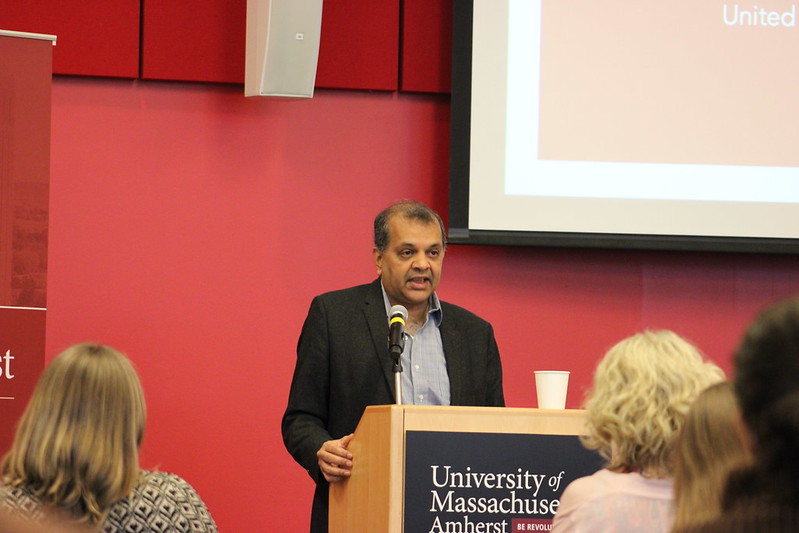On April 3, Suketu Mehta spoke at the University of Massachusetts as part of a two-day event called Immigration, Citizenship and Belonging. Referring to content from his book, “This Land is Our Land,” Mehta’s talk discussed the power that stories hold and how narratives shape ideologies of immigration.
Mehta explained that today, certain narratives of immigration are twisted by political stances and misconceptions. He said that society classifies and splits groups of people into large categories. Whether based on gender, race, political views or another category, people usually believe in classification, even though, “the individual is much more complex,” Mehta said.
Falsehoods, like conspiracy theories, based on these classifications are dispersed and believed easily, a lot of times, as Mehta said, because they are entertaining.
“A populist is, above all, a gifted storyteller,” Mehta said. “The only way a populist can be fought is by telling a true story. The problem is that lies can be widely entertaining.”
When it comes to the personal stories that are shared, Mehta explained that many asylum seekers must fabricate stories to increase their chances of achieving asylum. “The asylum bureaucracy demands atrocity,” he explained.
He spoke about a woman named Caroline, who he wrote about in the New Yorker, as she had to twist her story to gain asylum. Mehta said that many immigrants invent a false, in-depth “horror story” narrative to gain legal papers, like Caroline did.
Mehta explained how the incentive for asylum seekers to change their stories for survival needs causes a false, negative narrative of immigrants. The “horror stories” spread by media outlets and various populists create a negative portrayal of immigrants that can spiral into racism and inequality.
He explained that asylum seekers are not entering the U.S. to cause harm — many are immigrating for new opportunities, like education.
“The greatest lottery in the world today is the lottery of privilege,” Mehta said. “Your citizenship determines the trajectory of your life.”
Sophia Hutcheson, a freshman political science major, attended the talk after reading “This Land is Our Land.” She thought the talk would allow her to understand more about people’s stories and how to connect with more people.
“We talked about how there are problems in our storytelling that we can’t really connect with a lot of people, so I learned about how to see people who have conflict of interest and talk to them,” Hutcheson said. “When we are telling stories we really appeal to people’s minds and their consciousness.”
Mehta introduced the idea of being an interlocal, or someone who “belongs” to a number of different places. He related this idea back to himself, as someone who has lived in many places that he has called home. “In a time of shifting borders, interlocals are the reality and hope for the future of the planet,” Mehta said. “Home is not a geographically intact entity.”
He explained that by being around diversity and having lots of interlocal people around, there is a greater openness to new things.
“It is in this way that cultural identity is preserved in this world, and the continuity established within the rituals of the land left behind, and the land now inhabited,” he said.
Mehta’s talk was one of seven events over the course of the next two days, as a part of the Naturalization Ceremony being hosted on Tuesday, April 4. UMass, along with the United States Citizenship and Immigration Services will participate in naturalizing around 200 new citizens.
Saulo Depaula, assistant dean for the College of Social and Behavioral Sciences and an organizer of the event, commended Mehta, and said he was a great speaker for the event panel.
“Suketu is a journalist who writes about immigration and belonging, so looking at people in that space … We were looking for someone who could speak to that, and we found that what he writes and talks about is just exactly on theme, and what we are trying to communicate to everybody about immigration and citizenship, not just now, but in general,” Depaula said.
Eve Neumann can be reached at [email protected].



















